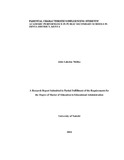| dc.description.abstract | The main purpose of this study was to investigate the parental characteristics
influencing students’ academic performance in public secondary schools in Isinya
District, Kenya. The study was further guided by the following research
objectives: to determine how the education level of parents influences the
academic performance of students in public secondary schools, to examine the
influence of parent’s attitude to education on the academic performance of
students in public secondary schools, to determine how parents’ economic status
affects the performance of students in public secondary and to establish the extent
to which family type affect the academic performance of the students in public
secondary schools in Isinya District, Kajiado County. A descriptive survey
research design was adopted in this study. The sample of this study included;42
PTA members, 150 students and 4 principals in public secondary schools in
Isinya District. In total, the sample size was 189. Questionnaires and interview
guides were used as the main instruments of data collection. The data was
analyzed using both qualitative and quantitative approaches. Quantitative data
analysis was used to analyze the data collected from the questionnaires, which
were coded into the computer with the help of the Statistical Package for Social
Sciences (SPSS). Data was presented in tables and graphs. Qualitative approach
was used to analyze the data retrieved from the interview guides. From the
analysis the following key findings were made: positive attitude encourages as
well as enables the students to know the role of education in their future.
Additionally, parental attitude encouraged students to love their studies and
perform well in school. Slightly less than a third of the students indicated that
parental level of education affected their academic performance to some extent.
The educational level of parents encourages the students to work harder and
achieve their goals whereas others indicated that it helped the students to aim
higher in their educational circles. Parents who were economically stable were in
a position to provide resources and materials and enroll students to the schools of
their choice. However, this was not the case among most of the parents who were
not economically stable. Family structure did affect the academic performance of
students either to some extent or to a greater extent. The following
recommendation was given: The Ministry of Education, school administrators and
the local authorities need to come up with frequent community based forums that
are specifically structured towards enhancing parental participation in their
children’s education. During these forums, the parents may be highlighted on the
importance of education not only in the child development but also community
growth. There is also need for policy formulation and implementation that
encourage parents who have never attained any formal education to get the
opportunity. These policies need to be introduced in the rural areas such as Isinya
District and parents encouraged to enroll. | en_US |

